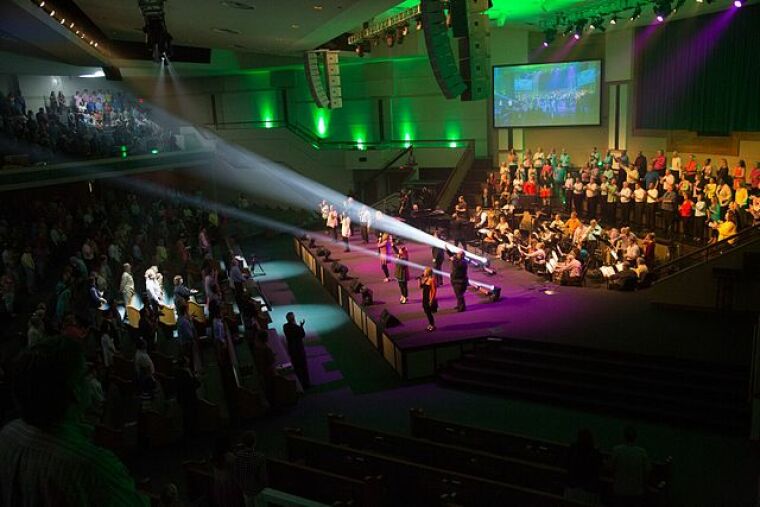Literal Bible interpretation boosts church growth, according to study

The findings of a new study suggested that churches that uphold a literal interpretation of the Bible grows faster than those that are more liberal.
The study, titled "Theology Matters: Comparing the Traits of Growing and Declining Mainline Protestant Church Attendees and Clergy," was based on surveys of 2,225 churchgoers in Ontario Canada, according to The Guardian.
In addition to the surveys, the authors also interviewed 29 clergy and 195 parishioners. The study is scheduled to be released next month in the international journal, Review of Religious Research.
"If we are talking solely about what belief system is more likely to lead to numerical growth among Protestant churches, the evidence suggests conservative Protestant theology is the clear winner," said David Haskell, the lead researcher of the study.
The beliefs and practices of the congregation and clergy in growing Protestant churches were compared with those that are declining.
Haskell noted that on all measures, the growing churches "held more firmly to the traditional beliefs of Christianity and were more diligent in things like prayer and Bible reading."
The results revealed that only 50 percent of the clergy from declining churches believe that it was "very important for non-Christians to become Christians," as opposed to 100 percent of the clergy from growing churches.
When it comes to Bible reading, 71 percent of clergy from growing churches read the scriptures daily while only 19 percent of clergy from declining churches do the same.
Among churchgoers, 46 percent read the Holy Book once a week compared with 26 percent from declining churches.
Ninety-three of clergy and 83 percent of the congregants from growing churches believe that Jesus rose from the dead compared with 56 percent of clergy 67 percent of churchgoers from declining churches.
About 90 percent of worshippers and 100 percent of the clergy from growing churches believe that God performs miracles and answers prayers while only 80 percent of worshippers and 44 percent of clergy believe the same in the declining churches.
It was also revealed that the services at growing churches employ a contemporary style of worship while the declining churches are more inclined to traditional styles.
Haskell expects some controversy regarding the study. "If you're in a mainline church and that church is dying, and you've just heard that the theological position that you have is likely what's killing it, you're not going to be very happy about that," he said.
A Pew study revealed that the Christian population in the U.S. has shrunk from 78.4 percent in 2007 down to 70.6 percent in 2015. The percentage of Americans who were religiously unaffiliated grew from 16.1 percent to 22.8 percent over the same period.
 Christians don't have to affirm transgenderism, but they can’t express that view at work: tribunal
Christians don't have to affirm transgenderism, but they can’t express that view at work: tribunal Archaeology discovery: Medieval Christian prayer beads found on Holy Island
Archaeology discovery: Medieval Christian prayer beads found on Holy Island Presbyterian Church in America votes to leave National Association of Evangelicals
Presbyterian Church in America votes to leave National Association of Evangelicals Over 50 killed in 'vile and satanic' attack at Nigerian church on Pentecost Sunday
Over 50 killed in 'vile and satanic' attack at Nigerian church on Pentecost Sunday Ukrainian Orthodox Church severs ties with Moscow over Patriarch Kirill's support for Putin's war
Ukrainian Orthodox Church severs ties with Moscow over Patriarch Kirill's support for Putin's war Islamic State kills 20 Nigerian Christians as revenge for US airstrike
Islamic State kills 20 Nigerian Christians as revenge for US airstrike Man who served 33 years in prison for murder leads inmates to Christ
Man who served 33 years in prison for murder leads inmates to Christ


 Nigerian student beaten to death, body burned over ‘blasphemous’ WhatsApp message
Nigerian student beaten to death, body burned over ‘blasphemous’ WhatsApp message 'A new low': World reacts after Hong Kong arrests 90-year-old Cardinal Joseph Zen
'A new low': World reacts after Hong Kong arrests 90-year-old Cardinal Joseph Zen Iran sentences Christian man to 10 years in prison for hosting house church worship gathering
Iran sentences Christian man to 10 years in prison for hosting house church worship gathering French Guyana: Pastor shot dead, church set on fire after meeting delegation of Evangelicals
French Guyana: Pastor shot dead, church set on fire after meeting delegation of Evangelicals ‘Talking Jesus’ report finds only 6% of UK adults identify as practicing Christians
‘Talking Jesus’ report finds only 6% of UK adults identify as practicing Christians Mission Eurasia ministry center blown up in Ukraine, hundreds of Bibles destroyed: 'God will provide'
Mission Eurasia ministry center blown up in Ukraine, hundreds of Bibles destroyed: 'God will provide' Church holds service for first time after ISIS desecrated it 8 years ago
Church holds service for first time after ISIS desecrated it 8 years ago Burger King apologizes for 'offensive campaign' using Jesus' words at the Last Supper
Burger King apologizes for 'offensive campaign' using Jesus' words at the Last Supper Uganda: Muslims abduct teacher, burn him inside mosque for praying in Christ’s name
Uganda: Muslims abduct teacher, burn him inside mosque for praying in Christ’s name